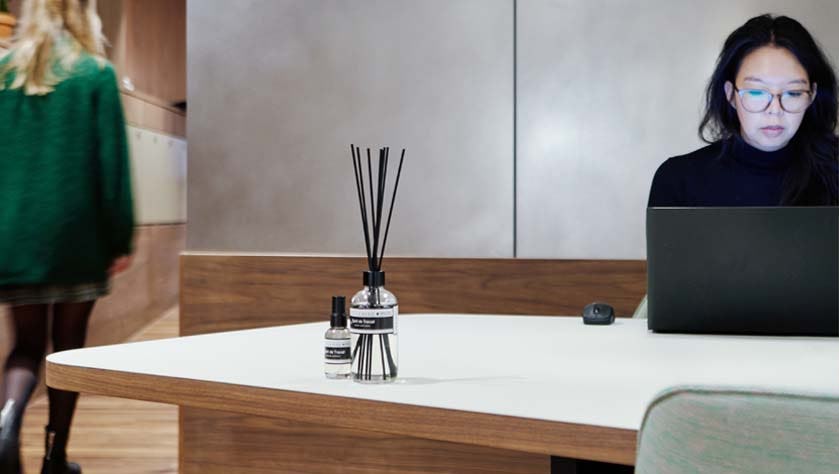
What do you do for Spaces?
CATHELIJN: I write articles on various topics for the online magazine – and hopefully, by that, spark some inspiration within the community. I’ve worked as an editor for a travel start-up and as a travel journalist for a magazine publishing house. Over two and a half years ago I quit my job and started working independently. I now work as a freelance (copy)writer, journalist, and I started an event for young entrepreneurs in Amsterdam called JOOST.
MAISIE: Together with my colleague Sophia, I am responsible for the sales of the meeting rooms for all 8 Spaces locations in the Netherlands. We have 80 beautiful meeting rooms in total which vary from 2 – 120 persons. The meeting rooms are perfect for brainstorming or different workshops sessions. But it’s also suitable for a conference or product presentation.
My role is to make sure that guests come to experience Spaces and to provide the best service so they can focus on their meeting/event.
LIEKE: I’m an IT Program Manager. Our main goal is to create the best IT platform for Spaces, where IT meets Business Operations in its best way. We always aim to work with solutions that really contribute to our business.
What were the most difficult parts of your job?
CATHELIJN: When you’re flying solo, most people assume the challenges of freelancing are paying rent and finding new gigs. For me this was never an issue. I found setting boundaries and coping with difficult people – who do not respect those boundaries – one of the biggest challenges of being your own boss.
Did you experience any bias because of your gender?
CATHELIJN: I’m afraid, as like many women, I would have to say yes. First time was actually when I was interning at one of the biggest newspapers in my country (the Netherlands). My editor in chief told me I was ‘too emotional’ for the Journalism sector, so I might reconsider. He even graded me less for it, saying it was good for me to ‘toughen up.’ Moreover, I’ve found myself working in an office where chores like cleaning the kitchen sink or unpacking the dishwasher were always left – and expected of – female colleagues. Well, no one ever got promoted by cleaning the communal kitchen, so there’s that.
With that being said, I must also say I’ve had great, valuable working experience with male workers. Sometimes, it’s easier. Men are quite level-headed, straight to the point. In some working situations, I prefer that over women who tend to overthink – like myself!
MAISIE: Well, a few years ago, when I worked as an event planner in a hotel I was responsible for the preparations for a three day conference. I was the main point of contact and had to liaise with the (male) CEO of a big Indian Tyres company.
During these meetings he did not even look me in the eye when he spoke and only focused on my male colleagues. At the end of our first meeting I gave him my business card and he also made a remark asking if I was available 24/7 – and winked while he was saying that. I responded by saying: no only during office hours from 09:00-17:00. That’s the only thing that came to my mind then. I felt completely ignored the whole time and, as a woman, insulted by his remarks.
LIEKE: I’m lucky enough to say no. I’ve dealt with amazement that I’m working in this area from men sometimes but never sexism.
What does equality mean for you?
MAISIE: Equality to me, personally, means treating each other the same, regardless of gender, race, religion and age.
How do you fight bias in the workplace?
LIEKE: I don’t believe you have to fight it, if you have the knowledge or are willing to learn it’s easy to prove them wrong.
What advice would you like to give young women hoping to get into your field?
CATHELIJN: Try to write as much as possible, start a blog, make valuable connections with publishing houses or papers/magazines. Do multiple internships and don’t be afraid to show them what you’ve got; be assertive. But, don’t lose sight of your own values – it’s one of the biggest challenges in your working life. Especially in journalism: it’s a stressful, individualistic world. You have to be able to cope with high pressure, constant deadlines and less appreciation. People will always test you, try to cross your boundaries and abuse their power. It’s your job to not let them.
MAISIE: Try to always get the most out of your job and have fun with colleagues and others whilst doing it. Also: a work/life balance is key. What I learned in the last couple of years and what is described so well in the last Spaces article: be yourself. (You can the article, written by our wonderful Cathelijn, here).
I think that’s a very important part to build more relationships. I am still learning as well!
LIEKE: Go for it! It’s one of the most rewarding industries I have worked in, with so many opportunities. While technology is an industry itself it also overlaps all others, which makes it possible to combine tech with any industry you would like to work in.
Got some time in between your next video calls? Check out the other articles we have on offer.
Share this article
 Read now Working from home? How to stay fit and focused
Read now Working from home? How to stay fit and focused
 Read now Earth Hour: How to make your business eco-friendly
Read now Earth Hour: How to make your business eco-friendly